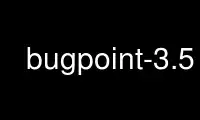
This is the command bugpoint-3.5 that can be run in the OnWorks free hosting provider using one of our multiple free online workstations such as Ubuntu Online, Fedora Online, Windows online emulator or MAC OS online emulator
PROGRAM:
NAME
bugpoint - automatic test case reduction tool
SYNOPSIS
bugpoint [options] [input LLVM ll/bc files] [LLVM passes] --args program arguments
DESCRIPTION
bugpoint narrows down the source of problems in LLVM tools and passes. It can be used to
debug three types of failures: optimizer crashes, miscompilations by optimizers, or bad
native code generation (including problems in the static and JIT compilers). It aims to
reduce large test cases to small, useful ones. For more information on the design and
inner workings of bugpoint, as well as advice for using bugpoint, see
llvm/docs/Bugpoint.html in the LLVM distribution.
OPTIONS
--additional-so library
Load the dynamic shared object library into the test program whenever it is run. This
is useful if you are debugging programs which depend on non-LLVM libraries (such as the
X or curses libraries) to run.
--append-exit-code={true,false}
Append the test programs exit code to the output file so that a change in exit code is
considered a test failure. Defaults to false.
--args program args
Pass all arguments specified after --args to the test program whenever it runs. Note
that if any of the program args start with a "-", you should use:
bugpoint [bugpoint args] --args -- [program args]
The "--" right after the --args option tells bugpoint to consider any options starting
with "-" to be part of the --args option, not as options to bugpoint itself.
--tool-args tool args
Pass all arguments specified after --tool-args to the LLVM tool under test (llc, lli,
etc.) whenever it runs. You should use this option in the following way:
bugpoint [bugpoint args] --tool-args -- [tool args]
The "--" right after the --tool-args option tells bugpoint to consider any options
starting with "-" to be part of the --tool-args option, not as options to bugpoint
itself. (See --args, above.)
--safe-tool-args tool args
Pass all arguments specified after --safe-tool-args to the "safe" execution tool.
--gcc-tool-args gcc tool args
Pass all arguments specified after --gcc-tool-args to the invocation of gcc.
--opt-args opt args
Pass all arguments specified after --opt-args to the invocation of opt.
--disable-{dce,simplifycfg}
Do not run the specified passes to clean up and reduce the size of the test program. By
default, bugpoint uses these passes internally when attempting to reduce test programs.
If you're trying to find a bug in one of these passes, bugpoint may crash.
--enable-valgrind
Use valgrind to find faults in the optimization phase. This will allow bugpoint to find
otherwise asymptomatic problems caused by memory mis-management.
-find-bugs
Continually randomize the specified passes and run them on the test program until a bug
is found or the user kills bugpoint.
-help
Print a summary of command line options.
--input filename
Open filename and redirect the standard input of the test program, whenever it runs, to
come from that file.
--load plugin
Load the dynamic object plugin into bugpoint itself. This object should register new
optimization passes. Once loaded, the object will add new command line options to
enable various optimizations. To see the new complete list of optimizations, use the
-help and --load options together; for example:
bugpoint --load myNewPass.so -help
--mlimit megabytes
Specifies an upper limit on memory usage of the optimization and codegen. Set to zero
to disable the limit.
--output filename
Whenever the test program produces output on its standard output stream, it should
match the contents of filename (the "reference output"). If you do not use this option,
bugpoint will attempt to generate a reference output by compiling the program with the
"safe" backend and running it.
--run-{int,jit,llc,custom}
Whenever the test program is compiled, bugpoint should generate code for it using the
specified code generator. These options allow you to choose the interpreter, the JIT
compiler, the static native code compiler, or a custom command (see --exec-command)
respectively.
--safe-{llc,custom}
When debugging a code generator, bugpoint should use the specified code generator as
the "safe" code generator. This is a known-good code generator used to generate the
"reference output" if it has not been provided, and to compile portions of the program
that as they are excluded from the testcase. These options allow you to choose the
static native code compiler, or a custom command, (see --exec-command) respectively.
The interpreter and the JIT backends cannot currently be used as the "safe" backends.
--exec-command command
This option defines the command to use with the --run-custom and --safe-custom options
to execute the bitcode testcase. This can be useful for cross-compilation.
--compile-command command
This option defines the command to use with the --compile-custom option to compile the
bitcode testcase. This can be useful for testing compiler output without running any
link or execute stages. To generate a reduced unit test, you may add CHECK directives
to the testcase and pass the name of an executable compile-command script in this form:
#!/bin/sh
llc "$@"
not FileCheck [bugpoint input file].ll < bugpoint-test-program.s
This script will "fail" as long as FileCheck passes. So the result will be the minimum
bitcode that passes FileCheck.
--safe-path path
This option defines the path to the command to execute with the
--safe-{int,jit,llc,custom} option.
EXIT STATUS
If bugpoint succeeds in finding a problem, it will exit with 0. Otherwise, if an error
occurs, it will exit with a non-zero value.
Use bugpoint-3.5 online using onworks.net services
